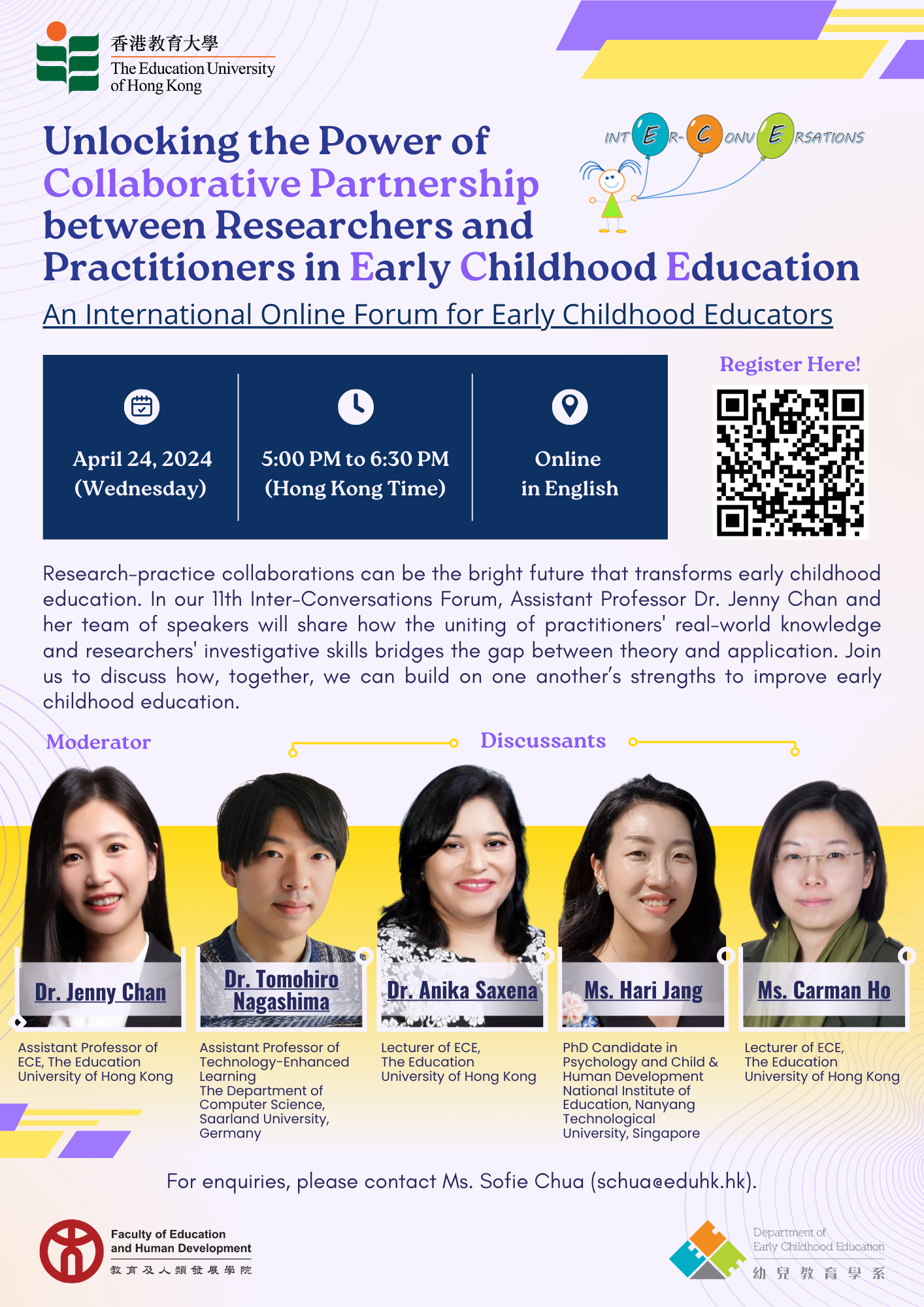Date: Wednesday, April 24, 2024
Time: 5:00 PM to 6:30 PM (Hong Kong Time)
Format: Online in English
Research-practice collaborations can be the bright future that transforms early childhood education. In our 11th Inter-Conversations Forum, Assistant Professor Dr. Jenny Chan and her team of speakers will share how the uniting of practitioners’ real-world knowledge and researchers’ investigative skills bridges the gap between theory and application. Join us to discuss how we can build on one another’s strengths to improve early childhood education together.
Register to attend live or to be notified when the Zoom recording is available for viewing.
Biography of Moderator
Dr. Jenny Yun-Chen Chan is an Assistant Professor in the Department of Early Childhood Education at The Education University of Hong Kong (EdUHK). Before joining EdUHK, she received her PhD in Developmental Psychology from the University of Minnesota – Twin Cities and conducted research in Learning Sciences and Technologies at Worcester Polytechnic Institute. She is an editorial board member of Cognitive Development and a governing board member of the Mathematical Cognition and Learning Society. Dr. Chan’s research examines the mechanisms and cognitive processes involved in mathematical development. Her work focuses on the effects of (a) perceptual and embodied features in the environment, as well as (b) cognitive, affective, and social factors on mathematical learning. She collaborates with stakeholders to study their interactive effects on mathematical development.
Biographies of Discussants
Dr. Tomohiro Nagashima is a Junior (Assistant) Professor of Technology-Enhanced Learning in the Department of Computer Science at Saarland University, Germany. He conducts interdisciplinary research at the intersection of the Learning Sciences, Human-Computer Interaction (HCI), and Cognitive Science to better understand and support student learning using learning technology. He closely works with school teachers and students to co-design intelligent learning systems and use those technologies to meaningfully support students’ self-regulated learning behaviors, informed choice-making, and cognitive understanding in mathematics learning. He holds a PhD in Human-Computer Interaction from Carnegie Mellon University and an MA in Education from Stanford Graduate School of Education in the United States.
Dr. Anika Saxena is a Lecturer in the Department of Early Childhood Education (ECE) at EdUHK. Her teaching areas include early childhood teacher education, leadership, curriculum, technology integration, and computational thinking in early childhood education. Trained as a science, computer science, and ECE teacher, Dr. Saxena worked in ECE education in Hong Kong for many years, holding several positions of senior leadership in international and local schools, gaining a wide experience in the areas of ECE curriculum, teacher training, leadership and technology integration in education. Dr. Saxena’s research interests are in early childhood teacher education, technology integration in education, flipped classrooms, artificial intelligence and computational thinking in education, and creative aspects of teaching and learning. Dr. Saxena, a renowned researcher and practitioner, has collaborated extensively with various stakeholders in her research endeavors. Her work aims to inspire researchers and practitioners to think deeply about effective collaboration and its role in promoting child development. Having occupied diverse roles such as a parent, teacher/principal, teacher educator, and researcher, Dr. Saxena brings a wealth of experiences and valuable advice on research-practice collaboration that she eagerly shares with both researchers and community members.
Ms. Hari Jang is a PhD candidate at the National Institute of Education (NIE), Nanyang Technological University in Singapore. Before joining NIE, she served as a primary school teacher in South Korea and a Korean language instructor at the National University of Singapore. Her passion lies in advancing teacher professional development through web-based training and coaching, promoting inclusive education, and researching evidence-based practices (EBPs) to support students with special educational needs. With around ten years of experience in education research, Hari has collaborated with various stakeholders, including teachers, allied educators, school leaders, educational psychologists, and Ministry of Education (MOE) officers. Particularly, her ongoing PhD project allows her to closely engage with stakeholders within a primary school, facilitating the implementation of an EBP among general education teachers. Drawing from her experience both as a researcher and a teacher, Hari navigates the bridge between research and practice, ensuring the sustainability of EBPs.
Ms. Carman Ho is a Lecturer in the Department of ECE at EdUHK. Currently serving as the programme leader of BEd (ECE) (3-year part-time) programme and a EDB-funded Certificate in Professional Development Programme for kindergarten Middle Leaders, Carman’s teaching portfolio also covers “School-Home-Community Collaboration,” “Curriculum leadership,” “Sustainable Preschool Management,” “Supporting Children’s Learning at School and Home,” “Child Development,” “Field Experience,” and other ECE-related courses. Ms. Ho also actively engages in collaborative ventures with community partners in some funded projects, such as developing “Innovative Teaching and Learning Packages on Disaster Education for Kindergarten Students,” providing coaching support for community-based Play Hubs in KeySteps@JC 2.0 project and providing consultation support in various QEF projects in partnership with kindergartens. Her unwavering passion lies in empowering pre-service and in-service Early Childhood Educators, enabling them to forge meaningful connections between their professional expertise and the needs of the young generation through fostering a collaborative approach with community stakeholders.
